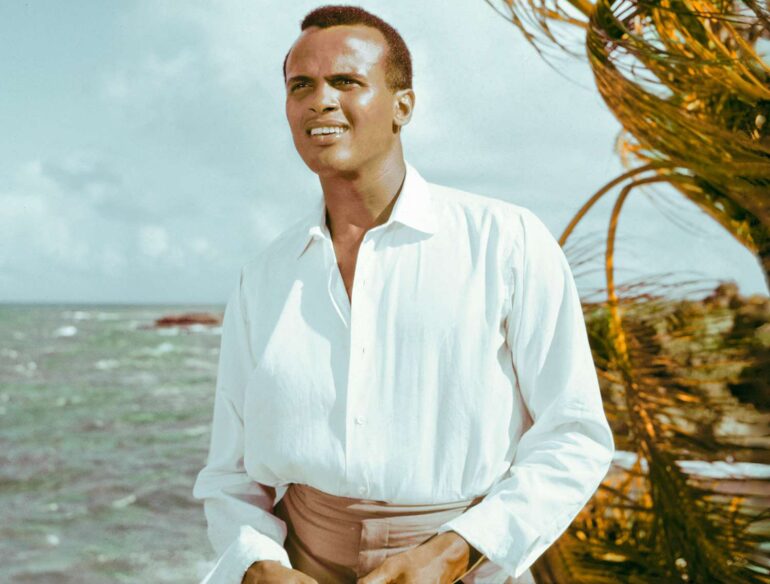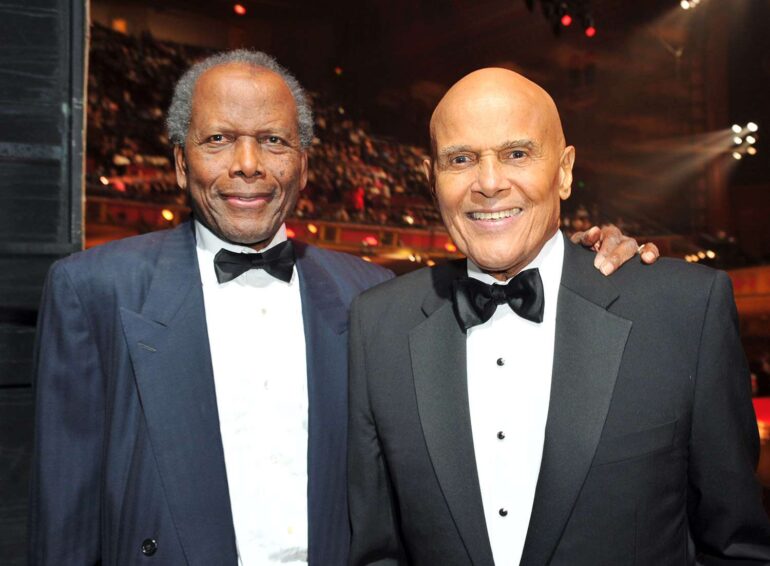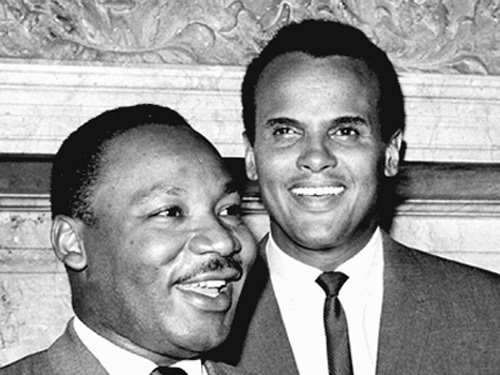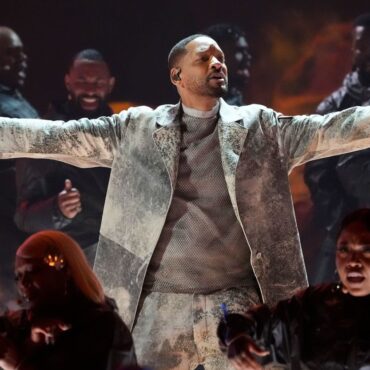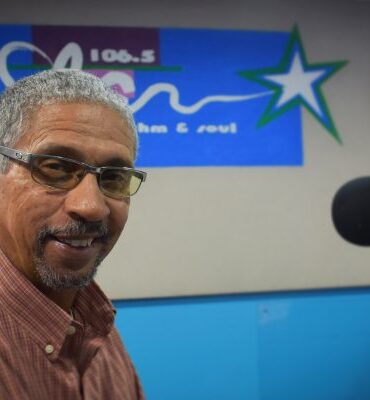A quick “Day-O” from Harry Belafonte’s “The Banana Boat Song.” :04
Listeners:
Top listeners:
-
play_arrow
Star 106.5 FM Star 106 Hits
-
 play_arrow
play_arrow
Flower Power Festival Podcast Robot Heart
-
 play_arrow
play_arrow
Tech House Podcast Robot Heart
-
 play_arrow
play_arrow
Winter Festival Podcast Robot Heart
-
play_arrow
Summer Festival Podcast Robot Heart
Harry Belafonte, singer, actor and activist for civil rights and social justice, has died at age 96.
- Born Harold George Bellanfanti Junior on March 1st, 1927 in Harlem section of Manhattan, of Afro-Jamaican, Scottish and Dutch Jewish descent.
- Lived in both Jamaica and New York as a child.
- Began his career in the mid-1950s as both stage and film actor and as a club singer in New York.
- Sang folk music, calypso, blues and gospel, breaking through in 1956 with Calypso, the first LP by a solo artist ever to sell over a million copies.
- Best known songs were “Matilda,” “The Banana Boat Song (Day-O)” and “Jamaica Farewell.”
- Dubbed the “King of Calypso” in the U.S., he’d record five calypso albums over the course of his 35 year recording career.
- Released over 30 studio and live albums and won three Grammys, including a Lifetime Achievement Award. Also won one Emmy and one Tony award.
- Acted in about a dozen feature films and appears in about the same number of documentaries.
- Best known films include Carmen Jones (1954) and Buck and the Preacher (1972) and Uptown Saturday Night (1974), the last two with acting school buddy Sidney Poitier.
- An activist in the Civil Rights movement, he was a confidante of Dr. Martin Luther King and helped King and his family financially.
- Involved in organizing and bankrolling the 1963 March on Washington and 1964s Mississippi Freedom Summer.
- Would work on behalf of numerous worldwide social justice causes and was a prime organizer of USA for Africa, the all-star ensemble that created the 1985 single “We Are the World” to benefit African famine relief, which he sang on as part of the chorus.
- Received Kennedy Center Honors in 1989, the National Medal of Arts in 1994, the Grammy Lifetime Achievement Award in 2000.
- Last concert was 2003 Atlanta Opera benefit.
Harry Belafonte was born in Harlem to parents of Afro-Jamaican, Scottish and Dutch Jewish descent.
He grew up in New York, but lived in Jamaica, where both his parents were from, from age 5 to 13. He returned to New York for high school and, after a stint in the Navy during World War Two, took acting classes and began singing in in local clubs, working in a variety of styles, including folk, calypso, blues and gospel.
His music, movie and stage careers all began to blossom in the early 1950s. He starred in his first two films, Bright Road and the musical Carmen Jones, alongside Dorothy Dandridge. He also would make two popular movies in the 1970s with his one time acting class buddy Sidney Poitier, Buck and the Preacher and Uptown Saturday Night and, late in life, play a ’60s activist in Spike Lee‘s BlacKkKlansman.
In 1956, his second album, Calypso, was his breakthrough, helping to popularize Caribbean calypso music in the U.S. through such songs as “Matilda,” “Day-O (The Banana Boat Song” and “Jamaica Farewell,” although all three were actually closer to the Jamaican folk music known as mento than to calypso, which originated in Trinidad. That said, Calypso, became the first album by a solo artist to sell a million-copies.
Belafonte would go on to release nearly 35 studio and live albums in a recording career that spanned about the same number of years, and earn him two Grammys plus, in 2000, a Grammy Lifetime Achievement Award. His other awards include Kennedy Center Honors in 1989, the National Medal of Arts in 1994 and and the Motion Picture Academy’s Jean Hersholt Humanitarian Award in 2014.
Aside from his career in entertainment, Belafonte was well known as an activist in the Civil Rights movement of the 1950s and ’60s. He was a friend and confidante to Martin Luther King, who helped both King and his family financially. He was involved in organizing and bankrolling the 1963 March on Washington and 1964s Mississippi Freedom Summer.
Two decades later, he was one of the prime organizers of USA for Africa, the ad hoc all-star group that created the “We Are the World” video and single to raise money for African famine relief.
Belafonte was married three times, to Margarite Byrd, from 1948 through 1957; to Julie Robinson from 1957 through 2004; and to photographer Pamela Frank since 2008. He had two daughters with Margarite, Adrienne and Shari, and a daughter, Gina and son, David, with Julie. He had five grandchildren.
Harry Belafonte on what “We Are the World” said about artists. OC:…highly misguided. :21
“Artists are usually described as a large mass of humanity that’s narcissistic and very self-serving, and we take bum raps all the time for things we do. The only thing that ‘We Are the World’ truly proved is that such definitions are, at best, highly, highly misguided.”
Harry Belafonte on trying to find solutions to global problems. OC:…her humanity. :21
“When I think about the world and its complexities and how difficult it is for us to find solutions, I think sometimes all we need do is to turn and to look at a neighbor. And in that neighbor we might see something that will give us the solution, because we might be touched by his or her humanity.”
Petula Clark recalls the controversy caused by her touching Harry Belafonte while singing a duet on her 1968 TV special, Petula. OC…for a moment. :28 [phone quality]
“The duet was a song which I had co-written and it was something that we felt very strongly about, Harry and I. We were very emotional when we sang the song. And when we taped it, I touched Harry’s arm. That, of course, was really the cat among the pigeons, I mean the sponsors were shocked that I, a white woman, had touched a black man’s arm. And they really shut down the program for a moment.”
Written by: admin
Similar posts
Chart
-
Top popular
Is Trey Songz Dating Yasmine Lopez? Shirtless Mirror Selfie With Model Sparks Romance Rumors
Jada Pinkett Smith and Willow Smith Reveal They Both Considered Surgically Enhancing Their Butts
OCT 14 BIRTHDAYS
Serena Williams Accused of Bleaching Her Skin to Look More White, But Ended Up Looking like Marlon Wayans From “White Chicks” Mixed With Sammy Sosa
MEGAN THEE STALLION: Swimsuit Line Launch
BUILD YOUR RADIO WEBSITE WITH Pro Radio



